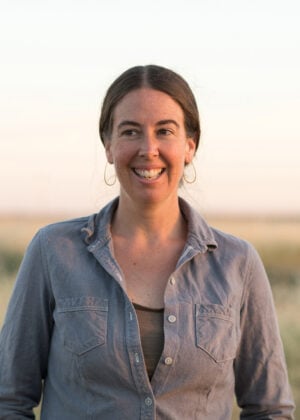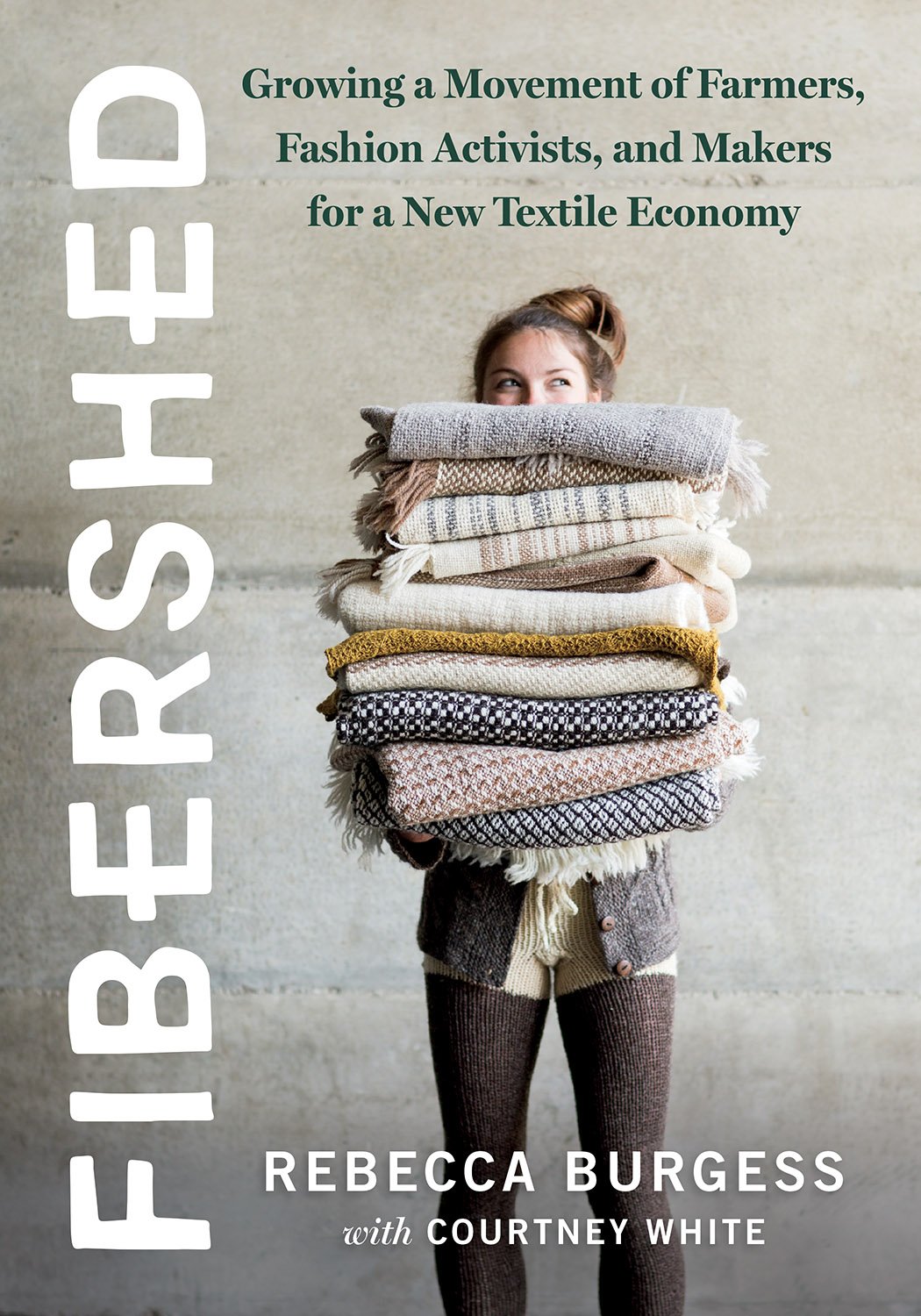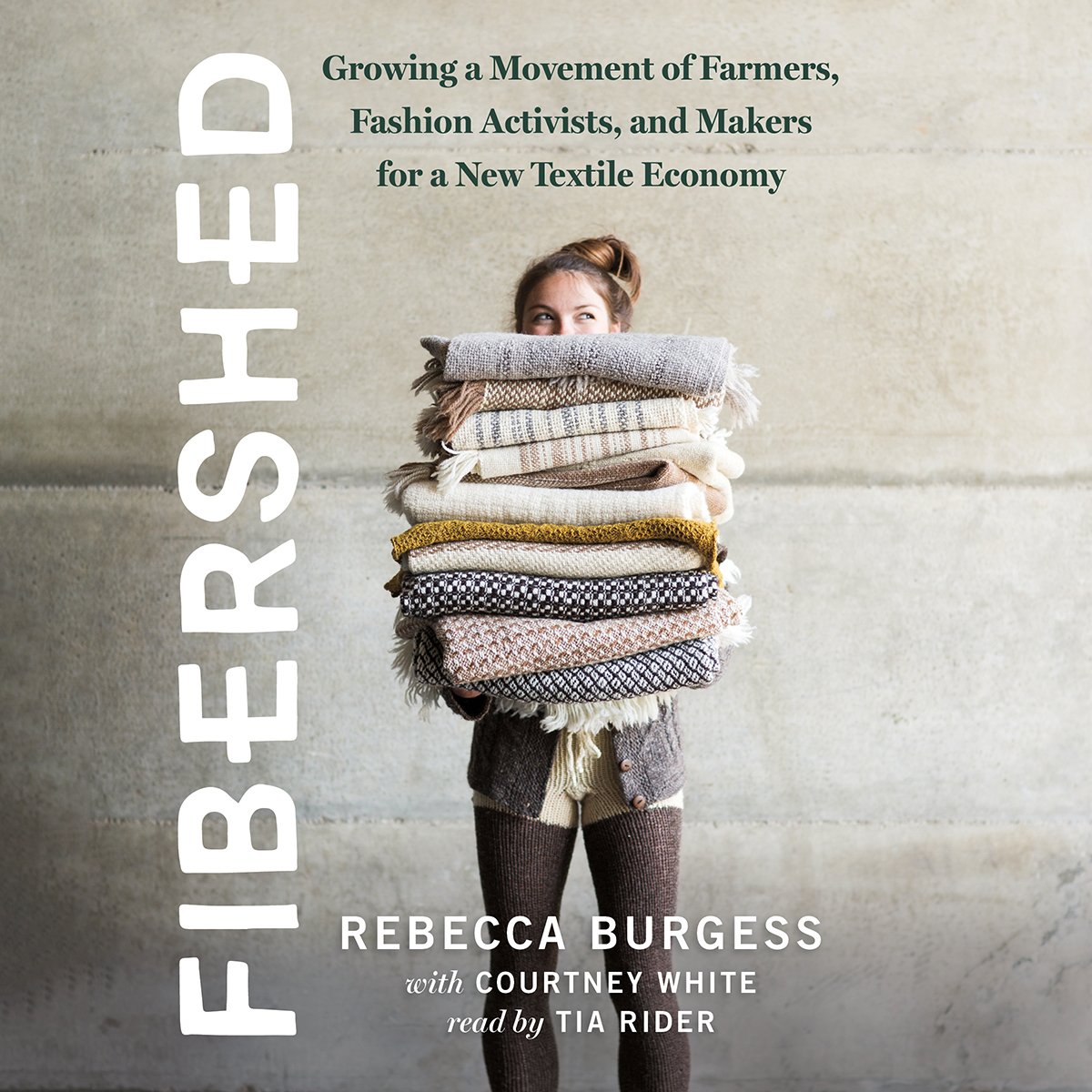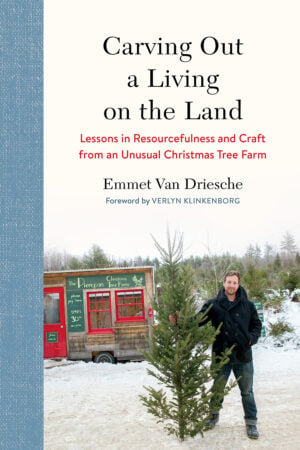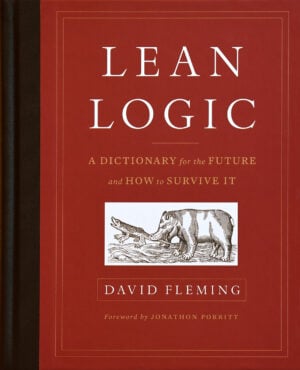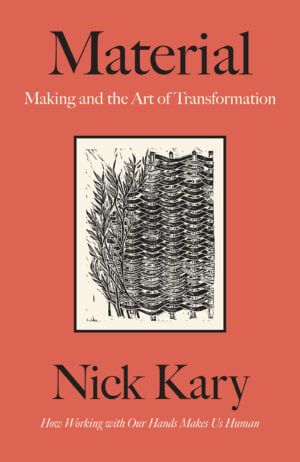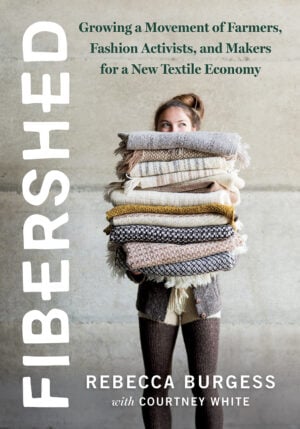Fibershed
Growing a Movement of Farmers, Fashion Activists, and Makers for a New Textile Economy
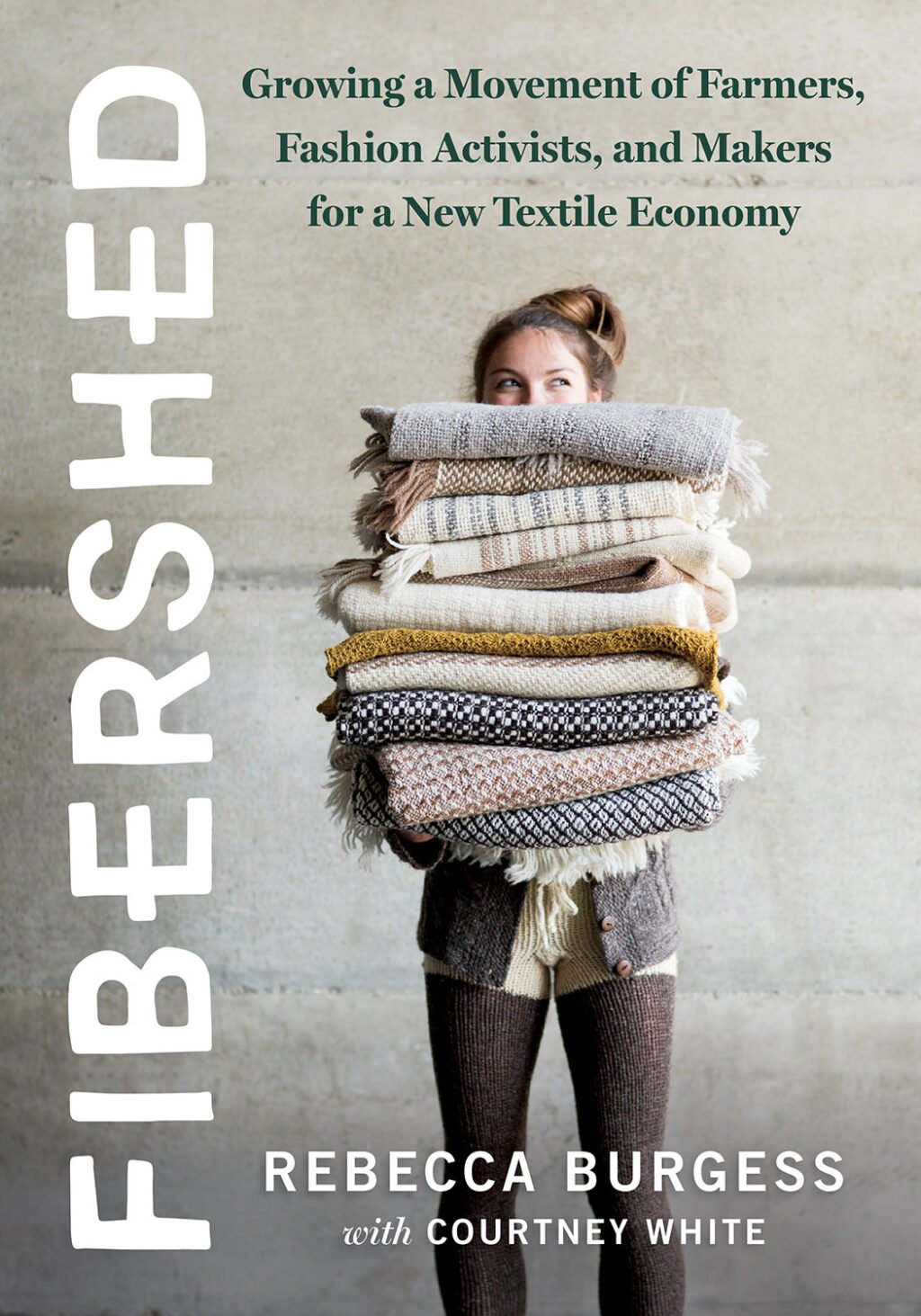
EXCERPTS
| Pages: | 288 pages |
| Book Art: | Full-color photographs throughout |
| Size: | 7 x 10 inch |
| Publisher: | Chelsea Green Publishing |
| Pub. Date: | November 19, 2019 |
| ISBN: | 9781603586634 |
Also available in:
Fibershed
Growing a Movement of Farmers, Fashion Activists, and Makers for a New Textile Economy
A new “farm-to-closet” vision for the clothes we wear–by a leader in the movement for local textile economies
There is a major disconnect between what we wear and our knowledge of its impact on land, air, water, labor, and human health. Even those who value access to safe, local, nutritious food have largely overlooked the production of fiber, dyes, and the chemistry that forms the backbone of modern textile production. While humans are 100 percent reliant on their second skin, it’s common to think little about the biological and human cultural context from which our clothing derives.
Almost a decade ago, weaver and natural dyer Rebecca Burgess developed a project focused on wearing clothing made from fiber grown, woven, and sewn within her bioregion of North Central California. As she began to network with ranchers, farmers, and artisans, she discovered that even in her home community there was ample raw material being grown to support a new regional textile economy with deep roots in climate change prevention and soil restoration. A vision for the future came into focus, combining right livelihoods and a textile system based on economic justice and soil carbon enhancing practices. Burgess saw that we could create viable supply chains of clothing that could become the new standard in a world looking to solve the climate crisis.
In Fibershed readers will learn how natural plant dyes and fibers such as wool, cotton, hemp, and flax can be grown and processed as part of a scalable, restorative agricultural system. They will also learn about milling and other technical systems needed to make regional textile production possible. Fibershed is a resource for fiber farmers, ranchers, contract grazers, weavers, knitters, slow-fashion entrepreneurs, soil activists, and conscious consumers who want to join or create their own fibershed and topple outdated and toxic systems of exploitation..
Listen to an audiobook sample!
Audio SampleReviews and Praise
“Collectively, we’ve been slowly waking up to the urgent need to farm our food in ways that restore and regenerate soils and whole landscapes; create connections between people, land, animals, and seasons; and rebuild local economies. Fibershed turns our attention to a parallel, equally urgent frontier: our clothes. We need this book, and we need it now.”—Nicolette Hahn Niman, author of Defending Beef
More Reviews and Praise
“Fibershed is a must-read for all clothing brands, whether years into their sustainability journey or just at the beginning. Burgess encourages us to think deeply and holistically about the impacts of fashion, reconsider our industry’s model of overconsumption, and to approach flashy biotech solutions with a critical eye. Fibershed proves that fashion can be a force for good, empowering farmers and makers while supporting local communities with Climate Beneficial textile supply chains.”—Megan Meiklejohn, Sustainable Materials and Transparency Manager, Eileen Fisher
“Fibershed is a deeply informed exploration of the political ecology of clothing and an urgent invitation to a new way of being in the world; one that respects the soil, the cycles of the year, and life itself. In this visionary manifesto of hope, Rebecca Burgess chronicles a personal journey with profound global implications: Human economies need not result in the degradation of either human culture nor the environment, but might, if done well, lead to the enrichment of both.”—Jeffrey Creque, PhD, Director of Rangeland and Agroecosystem Management, Carbon Cycle Institute
“This is an important book. It is bold, practical, optimistic––a vision of how things must be.”—Kate Fletcher, professor, Centre for Sustainable Fashion, University of the Arts, London, UK
“Rebecca has made an incredible contribution to the slow fashion movement through her organizing and advocacy work with the Fibershed organization. I’m thrilled to know that this work is now available to a broader audience through this thoughtful book. May we all learn from her wisdom, research, and knowledge as we create even deeper connections between farms, fiber art, and fashion.”—Katrina Rodabaugh, author of Mending Matters
“We clothe ourselves using fibers from cotton, trees, animals, and oil. The sins of oil-based fibers are well known, but lesser known are those of plant- and animal-based fiber production—themselves major contributors to global desertification and climate change. If we want to offer hope to future generations, we will have to root not only the food we eat, but the clothing we wear in a new, regenerative agriculture that manages livestock using the holistic planned grazing process. Fortunately, movement in this direction is underway. Rebecca Burgess’s well-researched book stokes a fire that has already been lit by many organizations collaborating and networking around the globe, and connects the dots between our clothing and our life-supporting environment. I would encourage everyone who wears clothes and has any concern for future generations to read this highly educational book.”—Allan Savory, president and cofounder, Savory Institute
“Rebecca Burgess is the Alice Waters of the slow fiber movement. Within the pages of Fibershed, she proves that carefully clothing oneself is a revolutionary act. While many wait for distant corporations and governments to curb toxic, unethical, and extractive industrial practices, Burgess demonstrates that the revolution is at hand in our own backyards. Fibershed is required reading for any clothing company that claims environmental and ethical responsibility.”—Dan Malloy, surfing ambassador, Patagonia; cofounder, Poco Farm, Ojai, CA
“Fibershed is a story of vision, persistence, and kindness. With patience and grace, Rebecca has restored a sense of gratitude for the overlooked grasses and herbaceous plants that were once our second skin. From the living world around her, she has stitched together the broken strands of textile arts, creating an economy of place where makers are artists and clothing is revered.”—Paul Hawken, author of Blessed Unrest; editor of Drawdown
Reviews and Praise
“Collectively, we’ve been slowly waking up to the urgent need to farm our food in ways that restore and regenerate soils and whole landscapes; create connections between people, land, animals, and seasons; and rebuild local economies. Fibershed turns our attention to a parallel, equally urgent frontier: our clothes. We need this book, and we need it now.”—Nicolette Hahn Niman, author of Defending Beef
“Fibershed is a must-read for all clothing brands, whether years into their sustainability journey or just at the beginning. Burgess encourages us to think deeply and holistically about the impacts of fashion, reconsider our industry’s model of overconsumption, and to approach flashy biotech solutions with a critical eye. Fibershed proves that fashion can be a force for good, empowering farmers and makers while supporting local communities with Climate Beneficial textile supply chains.”—Megan Meiklejohn, Sustainable Materials and Transparency Manager, Eileen Fisher
“Fibershed is a deeply informed exploration of the political ecology of clothing and an urgent invitation to a new way of being in the world; one that respects the soil, the cycles of the year, and life itself. In this visionary manifesto of hope, Rebecca Burgess chronicles a personal journey with profound global implications: Human economies need not result in the degradation of either human culture nor the environment, but might, if done well, lead to the enrichment of both.”—Jeffrey Creque, PhD, Director of Rangeland and Agroecosystem Management, Carbon Cycle Institute
“This is an important book. It is bold, practical, optimistic––a vision of how things must be.”—Kate Fletcher, professor, Centre for Sustainable Fashion, University of the Arts, London, UK
“Rebecca has made an incredible contribution to the slow fashion movement through her organizing and advocacy work with the Fibershed organization. I’m thrilled to know that this work is now available to a broader audience through this thoughtful book. May we all learn from her wisdom, research, and knowledge as we create even deeper connections between farms, fiber art, and fashion.”—Katrina Rodabaugh, author of Mending Matters
“We clothe ourselves using fibers from cotton, trees, animals, and oil. The sins of oil-based fibers are well known, but lesser known are those of plant- and animal-based fiber production—themselves major contributors to global desertification and climate change. If we want to offer hope to future generations, we will have to root not only the food we eat, but the clothing we wear in a new, regenerative agriculture that manages livestock using the holistic planned grazing process. Fortunately, movement in this direction is underway. Rebecca Burgess’s well-researched book stokes a fire that has already been lit by many organizations collaborating and networking around the globe, and connects the dots between our clothing and our life-supporting environment. I would encourage everyone who wears clothes and has any concern for future generations to read this highly educational book.”—Allan Savory, president and cofounder, Savory Institute
“Rebecca Burgess is the Alice Waters of the slow fiber movement. Within the pages of Fibershed, she proves that carefully clothing oneself is a revolutionary act. While many wait for distant corporations and governments to curb toxic, unethical, and extractive industrial practices, Burgess demonstrates that the revolution is at hand in our own backyards. Fibershed is required reading for any clothing company that claims environmental and ethical responsibility.”—Dan Malloy, surfing ambassador, Patagonia; cofounder, Poco Farm, Ojai, CA
“Fibershed is a story of vision, persistence, and kindness. With patience and grace, Rebecca has restored a sense of gratitude for the overlooked grasses and herbaceous plants that were once our second skin. From the living world around her, she has stitched together the broken strands of textile arts, creating an economy of place where makers are artists and clothing is revered.”—Paul Hawken, author of Blessed Unrest; editor of Drawdown

